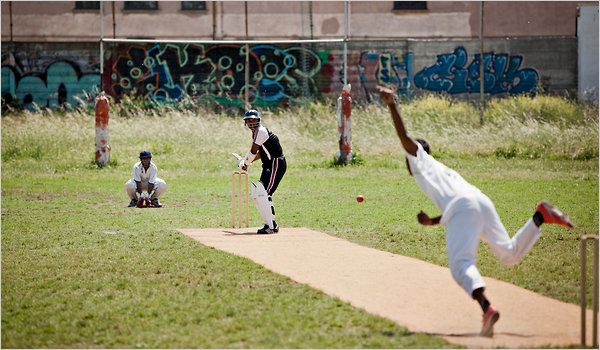Il cricket è il nuovo sport a Roma. Il reportaghe3 dell’International Herald Tribune del 3.6.2011:
Rome Journal
Bowlers and Batsmen Signal a Demographic Shift in an Eternal City
By RACHEL DONADIO
Published: June 3, 2011
ROME — On a sunny recent Sunday in a playing field on the outskirts of the city, the sounds of cheering could be heard. “Come on, come on, come on!” someone shouted in Italian from the sidelines to a player scrambling on the slightly overgrown field. “Wake up!” another cried.
But this wasn’t the usual weekend soccer league. Instead, the players, almost all from South Asia, were dressed in white pants and V-neck sweaters, or black jerseys — and they were playing cricket. Piazza Vittorio, a scrappy young team named after an ethnically diverse neighborhood in Rome, was facing off against Green Bangla, the presiding champions of an amateur cricket tournament now in its third year in the Rome area.
The match was held in the grassy center of a former dog track that had been transformed into a cultural association. Its stadium walls were covered in colorful graffiti. Broken beer bottles were scattered across the parking lot; nearby, families stood under a hot midday sun picking through mounds of used clothing piled near a garbage bin.
In these edgier patches of the city, whose schemers and dreamers were immortalized in the early 1960s by the film director Pier Paolo Pasolini, a new Rome is taking shape. It is filled with Bangladeshis, Sri Lankans, Pakistanis, Indians and other immigrants who are quietly transforming the texture of one of Europe’s most homogeneous cities, blending their own traditions with a Roman accent.
In Rome’s South Asian communities, “The kids like cricket more than soccer,” said Iqbal Hossein, manager of Green Bangla, as he stood on the sidelines smoking cigarettes and shouting directions in Bengali to the players. “I wanted to push the community forward using sports and culture,” by helping to organize the tournament, he added.
The Catholic aid organization Caritas said there were 74,000 Bangladeshis legally residing in Italy, 75,000 Sri Lankans and about 65,000 Pakistanis. But experts estimate there are about 65,000 to 70,000 South Asians living here illegally. Many men work as waiters or run shops.
Like many of Rome’s first Bangladeshi immigrants, Mr. Hossein’s parents came in the 1970s and worked at the Bangladeshi Embassy here, later bringing their extended family. Today, Mr. Hossein, 45, works as a technician for Italgas, an Italian energy company, and says he is happy in Rome.
“Twenty years ago the country definitely had fewer immigrants,” said Mr. Hossein, who was wearing mirrored sunglasses, a gold chain and a white spread-collar shirt rakishly unbuttoned. “But twenty years ago, there were also more jobs.”
Indeed, some of Green Bangla’s players, who are all in their 20s, grew up in Rome and said they wanted to stay. But in recent years, they said, it has been increasingly hard to find work.
“I’ve been here since I was a kid, so of course I have to think about a future here,” said Rasin Hakim, 22, who plays for Green Bangla.
Mr. Hakim said he moved to Rome from Bangladesh when he was 11 years old to join his father, who had moved here in 1992. “At first I didn’t speak Italian,” he said with a shy smile. “To learn, I had to watch a lot of cartoons on TV.”
He graduated from high school and says he is hoping to find steady work as a waiter or a restaurant manager.
In terms of the economy and the multicultural society, “Even the Italians have realized that Italy isn’t like it was 5 or 10 years ago,” he added.
On the nearby field, the Sunday match heated up and someone shouted, “Side ball!”
The captain of Green Bangla, Hussein Mosarraf, sat in the stands with a clipboard, keeping track of the complex scoring, the innings and wickets, writing each player’s name in neat block capitals along with his residence permit number. Because the tournament is organized by the Italian national sporting association, all players must be legal residents of Italy.
“The league was supposed to send a scorekeeper, but no one showed up,” said Mr. Mosarraf, 29, who has been captain of the team for four years, before it formally joined the tournament. “I organized the team because I missed cricket. In my hometown I always played.”
Mr. Mosarraf, who has been in Italy for eight years and has played in Italy’s Series B professional cricket league, says he likes his job at a catering company that makes the fried rice-and-cheese balls that are a traditional Roman snack. But he is not sure he will stay in Italy. His father, who operated a street cart, died two years ago, and after that his mother went back to Bangladesh. “Now I’m here all alone,” he said quietly.
During a break between innings, Federico Mento, who helped found the cricket tournament and is one of two Italians who play for Piazza Vittorio, was rallying his team’s players, who are mostly in their teens. The other Italian on the team is Fernando Cittadini, 16. “I got interested because I saw kids playing in my neighborhood,” he said.
His last name means “citizens” in Italian. “But he’s not a good citizen,” another Piazza Vittorio player, Saad Najam, 23, joked about his friend. “He throws wrappers on the ground.”
As the afternoon wore on, the Piazza Vittorio team grew demoralized, losing to the more experienced players from Green Bangla. As the sun began to set, one Green Bangla player called out from the bench to anyone who would listen. “Hey, look at me! I scored 50 points!” His accent, in flawless Italian, was as Roman as any Roman’s.


